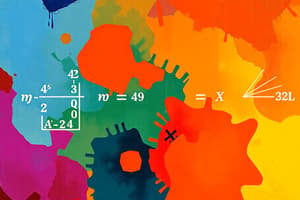Podcast
Questions and Answers
What type of equations involve terms with a degree of two?
What type of equations involve terms with a degree of two?
- Exponential equations
- Cubic equations
- Quadratic equations (correct)
- Linear equations
In algebra, what do variables like x, y, and z represent?
In algebra, what do variables like x, y, and z represent?
- Operators
- Constants
- Functions
- Placeholders for numerical values (correct)
How are linear equations represented when graphed?
How are linear equations represented when graphed?
- No lines, only points
- Straight lines (correct)
- Dotted lines
- Curved lines
Which of the following is NOT a method used to solve quadratic equations?
Which of the following is NOT a method used to solve quadratic equations?
How can systems of linear equations be solved?
How can systems of linear equations be solved?
What are some real-world applications of algebra mentioned in the text?
What are some real-world applications of algebra mentioned in the text?
How might artificial intelligence like Bing Chat revolutionize algebra problem-solving in the future?
How might artificial intelligence like Bing Chat revolutionize algebra problem-solving in the future?
What is a key benefit of understanding the language and concepts of algebra mentioned in the text?
What is a key benefit of understanding the language and concepts of algebra mentioned in the text?
Flashcards are hidden until you start studying
Study Notes
Maths: Cracking the Code with Algebra
Algebra, a subfield of maths, is where the art of solving equations and manipulating unknowns becomes a science. It's a fundamental tool in understanding the world around us, allowing us to tackle problems with precision and logical thinking.
In recent news, Microsoft Bing Chat has announced a feature that will enable users to opt out of web search results when asking for assistance with math problems, such as those in algebra. This "No Search" feature will serve to deliver faster and more accurate responses without the addition of potentially irrelevant web data.
Let's dive into the world of algebra to uncover some of its key concepts and their relevance in problem-solving.
The Language of Algebra
Algebra is built around symbols and expressions that represent numbers, variables, and operations. Variables, denoted by letters like (x), (y), and (z), are placeholders that can take on any numerical value as long as a specific rule or equation is obeyed.
Solving Linear Equations
Linear equations, such as (2x + 3 = 7), are the simplest type of equations in algebra. These equations represent a straight line on a graph, and solving them involves isolating the variable on one side of the equation.
Solving Quadratic Equations
Quadratic equations, such as (x^2 - 10x + 25 = 0), involve terms with a degree of two. These equations can be solved by factoring, using the quadratic formula, or completing the square.
Systems of Equations
Systems of linear equations, such as [x + y = 5] and [3x + 2y = 11], are pairs of equations that describe a set of intersecting lines or a single line (depending on the number of solutions). By using elimination or substitution methods, we can solve these systems to find the values of (x) and (y).
Applications of Algebra
Algebra has numerous real-world applications, such as in business, social science, and engineering. For example, a company might use algebra to calculate profit margins, while a social scientist might use algebra to analyze surveys and make predictions based on data.
Future of Algebra
In the future, artificial intelligence like Bing Chat might revolutionize how we interact with algebra problems. With the "No Search" feature, people can expect more accurate and prompt responses to their algebraic queries without having to rely on web search results.
Algebra, though a fundamentally mathematical topic, has broader implications and applications in our daily lives. By understanding the language and concepts of algebra, we arm ourselves with a powerful tool for deciphering the world around us and navigating the challenges it presents.
Studying That Suits You
Use AI to generate personalized quizzes and flashcards to suit your learning preferences.




